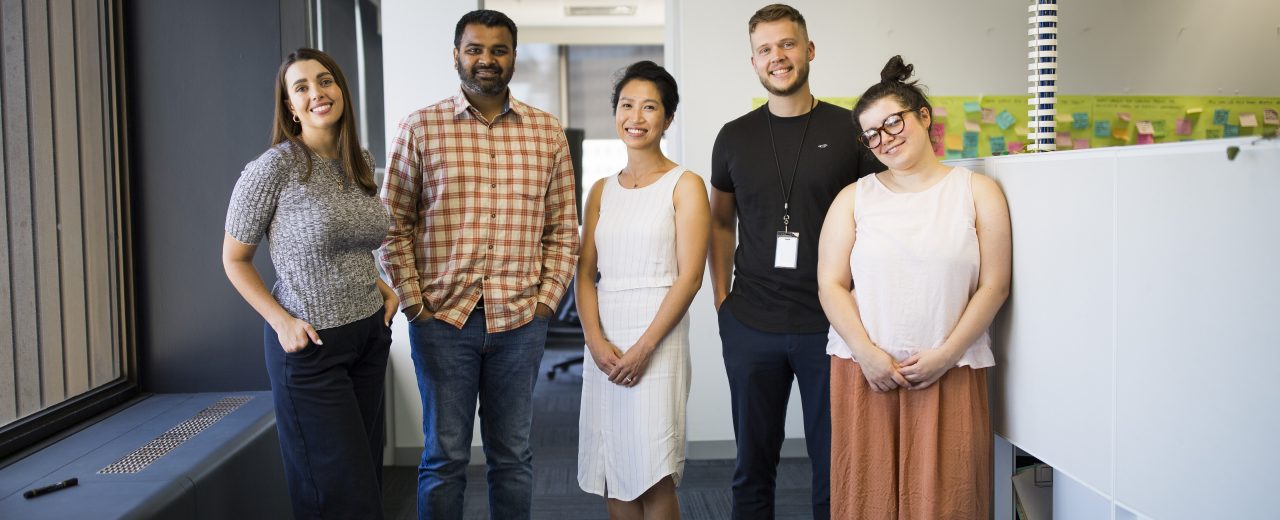Bringing AI to the legal help ecosystem with a free licence for NFPs
7 Mar 2023
Justice Connect, in partnership with the University of Melbourne, has developed a natural language processing artificial intelligence (AI) model that can diagnose legal problems within everyday language.
We are now accepting expressions of interest from not-for-profit organisations who would like to learn more about our AI model, and how they might use for free it in their work.
Express your interestWhy we built an AI model
Research shows that when people search for legal help online, they often struggle to correctly categorise and articulate their legal problem. In a follow-up survey of people lodging online applications for help from Justice Connect, 45% of respondents identified as not being confident in the legal problem category that applies to them.
While many organisations are attempting to build online legal services and resources to assist people at scale, linking people with the right tools in online settings is a barrier to success.
We built our AI model to address the challenge of categorising legal problems experienced by people without professional input. Our AI model allows people to express their problem in their own words, and based on the information provided, the model suggests the legal category or categories their legal issue may fall into.
The legal problem categorisation challenge does not just apply in self-directed online searching. Many legal and non-legal services struggle to efficiently run intake and triage for large volumes of requests for assistance. As a result, many people seeking legal help experience a “referral roundabout”, unable to get clarity on the nature of their problem and unable find the help they need.
How does our AI model work?
Our AI model diagnoses legal problems in natural language. The model has been developed through a partnership between the University of Melbourne School of Computing Science and Justice Connect.
The AI model has been trained on over 11,000 real-life, de-identified data samples from our help-seekers and broader community, which have each been analysed by volunteer lawyers and tagged with areas of law that relate to specific sections of text.
The result is a diagnostic model that is performing with 88% accuracy across 12 legal category areas.
For more information on how our AI model was built and trained, see our webpage ‘Our artificial intelligence (AI) project’.
How we use our AI model
We have integrated the AI model in our Intake Tool, an online application form that matches people with Justice Connect’s services based on their personal situation and legal problem. The tool also provides suggestions for more appropriate services if someone isn’t eligible for one of our services.
In the original version of our Intake Tool, help-seekers selected from a list of legal categories based on their own understanding of their legal problem, to be matched with a service. We found that high numbers of help-seekers would struggle to articulate their legal problem, and select either an incorrect category, or the catch-all category ‘Something else’. This lead to many ineligible enquiries requiring a manual triage process and subsequent rejection.
We have now integrated our AI model into our Intake Tool. In early test phases 30% of users were presented with the AI assisted pathway. Following successful evaluation, 50% of users are now presented with the AI model in their intake journey. The remaining users are shown the original category selection, with the option to choose to use the AI. This gives us an opportunity to compare the experience of those who used the AI tool and those who didn’t.
Since the integration of the AI model into the Intake Tool, we’ve found that when assisted by the AI model, only 9% of help-seekers will select the category ‘Something else’, compared to 23% who don’t use the AI model.
We are now looking at how we might integrate the AI model into our range of digital products, including our self-help resources.
Our AI Model integrated into our Intake Tool
How could your organisation use the AI model?
The AI model can be used in consumer-facing content, as well as to support services’ back-of-house work.
The model can assist help-seekers to identify whether there is a legal dimension to their life problem, and to help them more accurately categorise their legal problem.
Our AI model can be integrated into your new or existing online tools to support the triage, identification, or diagnosis of legal problems in products such as intake forms, self-help resources, service-finders, and chat bots.
The AI model can also assist legal service providers to carry out issue spotting exercises, whether in intake and triage, clinics, or to support post-service analysis of case files to identify trends in the types of legal matters presented.
Get involved
We are now offering our AI model to not-for-profit legal services organisations in Australia at no cost. We are seeking expressions of interest from organisations who would like to adopt the model in their work. Please note that at this early stage of distribution, the model will be made available at Justice Connect’s discretion, and support in the adoption of the model is not provided.
If you would like to learn more about our AI model, see a demonstration, and ask any questions, please submit your details on our Expression of Interest Form, and we’ll be in touch to set up a call.
Express your interest*At Justice Connect’s discretion, the AI model may be made available under a no-cost licence to not-for-profit legal service organisations. Should an organisation require extra support to integrate and use the Model, there may be costs associated.
You can also contribute to our AI project by providing natural language samples to help train the model.
Building an unbiased AI model takes more effort, but is particularly important for the legal service sector. We know that the people who most need legal help are also the same groups that are at significant risk of biased natural language processing systems that don’t perform as well for them.
We are actively seeking natural language samples from a diverse range of people including:
- Older people
- People with disability
- People with mental health issues and chronic illnesses
- People with HIV
- First Nations people
- People without tertiary qualifications
- People from culturally and linguistically diverse communities
- LGBTQIA+ people
- People who have recently migrated to Australia
We can provide your organisation with support to consider privacy and confidentiality implications surrounding contributing samples to this project.
Supply a sampleAbout Justice Connect’s Innovation and Engagement Team
Undertaking some of the most cutting-edge work at the intersection of justice, communications, and technology, our acclaimed Innovation and Engagement program works on a range of projects that aim to scale our reach and impact, improve the experience of getting and giving legal help, and strengthen and enable access to justice ecosystems.
Read more about our award-winning Digital Innovation work.



